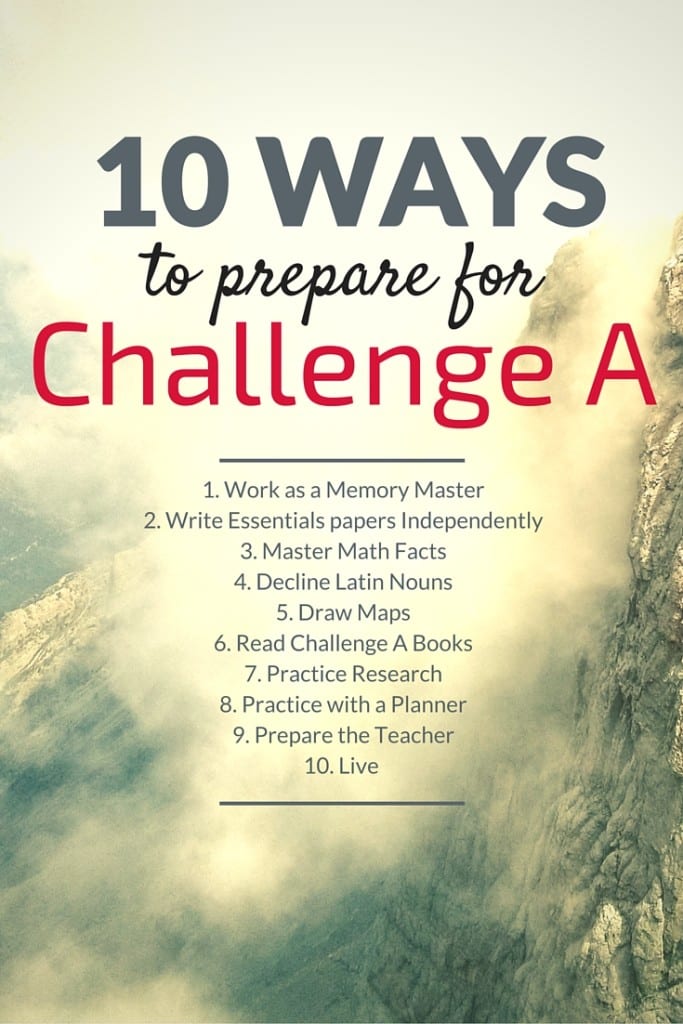10 Ways to Prepare for Challenge A
I want to begin with the disclaimer that you don't need Foundations/Essentials to have a great Challenge A experience. My first year directing, I had two students with 3 years of Foundations and Essentials, and then one student with one year experience, and two starting fresh with no experience. This year I have two joining my Challenge I class with no previous Classical Conversations experience. It can be done, and it can be done well. Don't think your child won't be successful if they haven't done any prep work.
For those of you who have journeyed up through the Foundations and Essentials programs and are fearfully excited about the Challenge years, I wanted to put together a list of some ways you can work now to prepare for the upcoming work. Those last few years of Foundations and Essentials in Classical Conversations are important years of development, but it can be challenging to be patient while you wait for the fruit bearing years of the Dialectic and Rhetoric stages.
I love homeschooling with a sister nearby who is also involved in Classical Conversations. She has a daughter that is a couple of years ahead of my son, so when we were preparing for Challenge A, I watched her to see how I could be ready for the challenge. Here are 10 ways you can prepare:

1. Work as a Memory Master
The Memory Master program is a memory incentive program where the students work to memorize every piece of memory work for the entire year. My first year in CC, I couldn't imagine how anyone could remember 24 history sentences, 24 science facts, over 24 math facts, 24 English grammar facts, over 24 geographical locations and features, 6 different verb tense conjugations in Latin, and 170 events on a timeline. It's daunting. However, as we trained our brains to retain information, the task became easier instead of harder.
I'm not saying that everyone should be a memory master, but I am saying that everyone in 4th, 5th, and 6th grades should do the work of a memory master. There is nothing that builds a student's confidence more than to know they've achieved a seemingly impossible goal. It will take time and LOTS of listening from mom, but it is worth it to help your child achieve something amazing.
When they get to Challenge A, the memory work is not over. They will be memorizing 57 catechism questions and answers from It Couldn't Just Happen. When they learn to draw the world, your student will be memorizing capitals, countries, and features. My son added over 600 items to his final map, and it still felt like he was just scratching the surface. Learning a language also requires a great deal of memorization - vocabulary and grammar.
Since the memory work will just continue to grow and develop, a great gift you can give your student is the blessing of knowing that they can memorize large quantities of information with success.
2. Let them Write their Essentials Papers by themselves
I'm all for helping Essentials students with their papers at the beginning. At some point, it's better to allow them to struggle through simple papers, so that when they reach a new level of writing assignments, they can be more independent.
It's hard to write a paper on your own, especially when your mom has so many good ideas to offer. I always know it's time to back off when my kids are staring at me for every word as if I could write the paper better than they could. At that point, I stop offering so many options, and start asking more questions to draw out their ideas.
In Challenge A, they'll move on to learning how to write using the Lost Tools of Writing, but they won't leave their IEW skills behind. Each week they'll be writing a Science Research paper using the fused outline model from IEW (Unit 6). In addition, they are free to add all of their stylistic elements to their LTW papers if they're familiar with them. Giving them a year or two to start becoming more independent in their writing will make their Challenge A year an easier transition.
3. Master Math Facts
It may seem like a simple thing, but all of higher math requires a quick and accurate recall of the basics. One of the reasons that math work takes so long is slowing down to count on fingers, skip count, or whatever other way your student is attempting to get to this information. In addition, many simple mistakes in calculating require going back and fixing work that was missed.
Take time every day to work on building your math fact muscles. It doesn't have to be a timed test. You could go outside and play with math. By taking time to focus on these fundamentals, your student will be blessed as they move into higher math studies.
4. Decline Latin Nouns
This is such a simple thing to practice, but such a complex activity to understand. In cycle 1 of Foundations, students memorize the five main declension endings. In English, we use word placement to show the jobs that nouns fulfill in a sentence. In Latin, they use a different ending to identify the job. I explain it all more here.
When students begin Challenge A, they are introduced to one declension at a time, and they begin practicing using and identifying all of the jobs the Latin nous are playing. If you've spent three years in Essentials, identifying the jobs will be simple for your student. What will be a bit more challenging is remembering all of the endings that each noun job should take. If they practice declining early, the whole concept will make a lot of sense when they arrive their first day.
I'm not talking about a lot of work each day, but pick one or two nouns from a declension you're focusing on and decline them. Here's a great list of vocabulary from the Henle book that they use in Challenge A.
5. Draw Maps
Map drawing is one of the hardest things in Challenge A, but also the most rewarding. It is so fun to observe, draw, and memorize your way through the world. Even the Challenge A guide is not an exhaustive list of everything you could ever memorize about world geography. Beginning a little early won't ruin the experience.
I've found these wonderful drawing books to be an outstanding resource for making geography drawing simple. Practice often, and practice timed. Sometimes quick bursts of work can produce better retention than long, laborious, although beautiful maps. I like to take one continent a year for my Foundations kids to focus on. Cycle 1 we focus on Africa, Cycle 2 is Europe, and Cycle 3 is the United States. South America is probably the easiest to draw on your own, and Asia can be tackled in Challenge.
The drawing books I love:
- Draw Canada/Greenland (coming soon!)
- Draw the USA
- Draw Europe
- Draw Africa
It doesn't really matter which continent you draw. Just practice drawing.
6. Read Challenge A Books
What?!! And ruin the surprise?!
Yes. That's what I said. Ruin the surprise, and lay the foundation for deeper thoughts.
Andrew Kern, author of the Lost Tools of Writing, says that reading a book for the first time is like shaking hands with an author. You're just barely getting acquainted with a book on the first read. All of the books read in Challenge A get better with each read. You won't be disappointed.
As they build their persuasive papers, the deeper they know the book, the deeper their ideas will be. There are only blessings that come from reading ahead.
Here's the book list:
- The Lion, The Witch, and The Wardrobe
- Carry On, Mr. Bowditch
- The Magician's Nephew
- Number the Stars
- Amos Fortune, Free Man
- The Secret Garden
- The Door in the Wall
- A Gathering of Days
- Crispin: The Cross of Lead
- The Bronze Bow
7. Practice Research
If you feel like they've really caught on to the IEW writing in Essentials, and your student needs a bit more of a challenge, then let them pick something from nature each week to research and write about. This is exactly what happens in Challenge A, but you're never going to run out of objects to research. This would make a great integration into presentations for Foundations.
This doesn't have to be a weekly assignment like it is in Challenge A. You could give them two weeks or a month for each research project if fitting an extra paragraph in your schedule for the week is overwhelming. It's better to get the practice slowly over time, than to cry about it weekly!
8. Practice with a Personal Planner
The theme for Challenge A is personal ownership. One way the students take ownership over their work is planning out their weekly studies. I love giving them room to fail here. It takes time and experimentation for a student to truly figure out how they work best. If they have an idea to save all of their math and Latin for after lunch, and then find that their brain works slower at that time of day, they will have learned a very important lesson about their study habits.
When a student owns their work, you don't have to sit over them and keep them moving every second. While your work may not require a planner, it would be a fun way to raise the bar for your budding Challenge students.
9. Prepare Yourself with Good Books
What good is preparing your student, if you're not also preparing the teacher. There are some great books that have really helped me in my thinking about education, and how my role must change as my students grow up, as well as books that have helped me identify a Biblical Worldview and how that defines everything we study.
Here's my book list of great ways to prepare yourself for the years to come:
- The Question by Leigh Bortins (cultivating discussion with your dialectic students)
- Total Truth by Nancy Pearcy (cultivating a Biblical Worldview)
- Teaching From Rest by Sarah Mackenzie (cultivating peace as you trust the Lord with the work He's called you to do)
10. Live
Above all, don't forget that your kids are kids! The fort building, the doll playing, the bike riding are all invaluable sources of education. One reason kids have such a hard time with writing is that they don't have life experience to draw from. So let them live! Let them have free time. Let them play in the dirt, find worms, or frogs, or bugs.
Rest in the truth that if you've been journeying up through the Foundations and Essentials programs, your students are already so much better prepared because they have a firm foundation to build upon. In Challenge I we have been singing so many of the Cycle 3 history sentences as we talk through the American documents. It's amazing how powerful that little peg of information is!
So there are ten ways to prepare for Challenge A. You don't need to do all of them! What are some ways you're preparing for Challenge A?
Betsy Strauss is an unexpected homeschooler, mother of three, who is in a relationship with a sweet man for life. She loves reading books, drinking coffee, and learning anything with her kids.



Thank you for this post! I am applying to be a Challenge A tutor as well as preparing my daughter for Challenge A next year, and this makes me feel as if I am more prepared than I thought! Of course, there is always room for improvement, but this is an incredibly helpful post. Thanks!
I will be the Challenge A Director in our community starting in a couple of weeks. Could I get the math 5 common topics chart?
I emailed a document to you that I had. I hope it helps!
I will be the Challenge A director for our community next year. What is the Math 5 Common Topics chart about?
The Math 5 Common Topics chart helps you lead a discussion about math. You use the 5 common topics from LTW (Definition, Comparison, Relationship, Circumstance, and Authority) to see the math behind the problem. You start with “what do you see?” This helps students who maybe don’t know how to tackle a tough math problem break it down to the parts that they know and then work from there. Many times students know what the answer is, but they don’t know how to explain the reasoning behind how they got the answer that they did. These discussion questions draw out the understanding of the math. It takes a little getting used to, but it really does generate some great math conversations!
I’m applying to direct Challenge A and my oldest next fall. Could I get this math chart too? Also what is LTW? Lost Tools of Writing?
You’re right! LTW is the Lost Tools of Writing. There is a Math 5 Common Topics chart on CC connected in the Challenge level uploaded by mrs.wonderflu. You’ll get all of these helpful tools when you go to training…and the ladies you’re in training with always have great documents they’ve created for the class that they’ll share with you! Blessings on your new adventure!
Thank you so much for writing this! This is our first year of CC. My son is in 6th grade, so it is his first and only year of Essentials and Foundations. It has been going really well, but I am already thinking about how to prepare him for next year, compared to his classmates who have been in the program from day one. This post has been super helpful to me!
I’m tutoring/directing Challenge A in the fall. What supplies (besides curriculum) do I need for the classroom? I have found a number of posts detailing what students need, but what will I need?
You don’t really need too much more! I always have dry erase markers, dice or cards for math games, and candy for incentives. Really it’s just stick in the sand in the classroom. I have many resources at home that help me prepare, but in class, you don’t need too much!
We just started CC last year, and I threw my freshman in challenge 1 and my Junior in Challenge C. Can I use the Latin with Andy to help them gain some Latin this summer? Just found out about this now, was thinking of skipping latin, but I see the benefit of it and would like to see if I can get it incorporated. Can multiple children take the Latin course you offer?
Exciting! You can absolutely use the Latin with Andy resource any time. The resource is geared to match the Henle 1 and 2 books. You will find tons of printable materials as well as a video with Andy explaining the concepts of every exercise for every Lesson in both the Henle 1 and Henle 2 books. You only need one account and your whole family can share. There is a printable video companion guide for every video as well. Your student can use them while they watch the videos to help them focus and stay tracking with his examples. Our hope is that Henle students can watch the videos and practice with Andy first, and then be able to go back to the Henle text more confidently. We also have a Facebook page with thousands of users who can help answer any question you may have. Andy will answer almost every time. Feel free to email me at familystyleschooling@gmail.com or lwabilling@gmail.com if you have any further questions. I hope this helps!
Hey Betsy! Do you still have your Math 5CT chart at your fingertips?
I’m not sure that was ever “mine” but I do have something I can send you!
Hi Betsy! Found your great Latin resources & ended up on this post. Would it be possible to get the Math 5 Common Topics chart? Thanks in advance!
I just sent you an email with a couple of documents. Sorry for the delay!